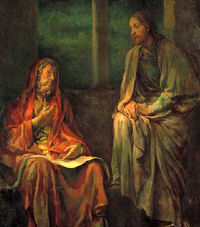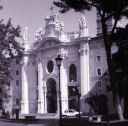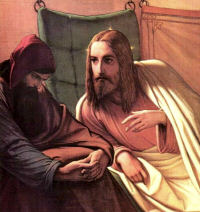Lent: March 10th
Fourth Sunday of Lent
Other Titles: Laetare Sunday
» Enjoy our Liturgical Seasons series of e-books!
Today is the halfway mark of the Sundays of Lent. This Sunday is known as Laetare Sunday for the first word of the Introit or Entrance Antiphon laetare (rejoice); it is a Sunday of joy. The celebrant has the option to wear rose-colored vestments. This is also the Second Scrutiny in preparation for the baptism of adults at the Easter Vigil.
The Church’s liturgy, on this the Fourth Sunday of Lent, invites us to retrace one of the fundamental dynamics of our baptismal re-birth through the Gospel account of the healing of the ‘man born blind’. It is the passage from the darkness of sin and error to the Light of God, who is the Risen Christ.
Meditation on the Liturgy
This Sunday has a place apart amongst the Sundays of Lent. As in Advent we had Gaudete Sunday, so in Lent we have a Sunday commonly called Laetare Sunday. The whole week, with its wealth of liturgical significance, is intensely interesting. This Sunday in vigesimal is in imitation of Byzantine custom, a Sunday in honor of Our Saviour's Cross, for which reason the Station is at Holy-Cross-in-Jersualem, a great devotional centre in Rome, especially during Passiontide. The great part of the Mass is inspired by this choice.
Lent is half over, and Easter is enticingly near. This Sunday is our foretaste of Easter joy. Knowing the ebb and flow of intensity even in our best efforts, God deals with us tenderly in rhythms of consolation and desertion. So today, thoughts of freedom and joy come in the middle of Lent. But the joy does more than cushion our failing energies and needle our lagging spirits. It is a positive, meaningful joy, born of our fruitful life in Christ and of our sweet freedom as His purchased children. The Eucharistic banquet of heavenly Bread, foreshadowed by the multiplied loaves and fishes and become now the Bread of Life for the whole Christian world, adds to our Laetare joy the quiet gladness of every festive meal.
Commentary for the Mass Readings for the Fourth Sunday of Lent, Year B:
The First Reading is taken from the Secon dBook of Chronicles 36:14-16, 19-23. It refers to the edict of Cyrus, the king of Persia, permitting the exiles to return to Jerusalem and rebuild the temple, which had been burned by the Chaldeans as a punishment from God for the infidelities of the Chosen People.
The Second Reading is from the Letter of St. Paul to the Ephesians 2:4-10. In today's extract St. Paul is emphasizing the gratuitousness of the gift of faith which the Ephesian converts have received. This gift which God gave them, even when they were sinners, had united them to Christ, and has given them the right to share in His glorious resurrection and inherit heaven with Him and through Him.
 The Gospel is from St. John 3:14-21. This man Nicodemus had a half-open mind as regards Jesus. He was moved by his teaching and miracles. He defended him when his companions were out to have Jesus arrested. He helped to have him properly buried when his enemies had him put to death, but that was as far as he went, apparently. There is no mention of him in the first Christian community of Jerusalem. What held him back, what kept him from giving himself fully to Jesus who spoke so kindly and told him so clearly that he himself was indeed a teacher who had come from God, that he had been offered by God as the sacrificial victim who would save the world? All Nicodemus had to do was to accept his word, "believe in him" and be baptized and he too would have eternal life.
The Gospel is from St. John 3:14-21. This man Nicodemus had a half-open mind as regards Jesus. He was moved by his teaching and miracles. He defended him when his companions were out to have Jesus arrested. He helped to have him properly buried when his enemies had him put to death, but that was as far as he went, apparently. There is no mention of him in the first Christian community of Jerusalem. What held him back, what kept him from giving himself fully to Jesus who spoke so kindly and told him so clearly that he himself was indeed a teacher who had come from God, that he had been offered by God as the sacrificial victim who would save the world? All Nicodemus had to do was to accept his word, "believe in him" and be baptized and he too would have eternal life.
Why did he not do this? The answer is given in the beginning of his story "He came to Jesus by night." He was one of the leading Pharisees and evidently was afraid of what they would think of him had they seen him associating with Jesus. How much more so did he dread what their reactions would be had he become a follower of him whom they called "this impostor." Nicodemus had only half of his mind open to the truth, the other half was closed and barred by his fear of what his own class—the leaders of the Jews—would think of him. He risked his own future happiness in order not to lose the present respect of his sinful associates.
What a foolish man we would all say! Yet, are not many of us often like Nicodemus, when it comes to living up to our following of Christ? There are Catholic men who would like to, and should, go much more often to Holy Communion but are afraid of what their fellow-parishioners, who receive but rarely, would think of them. There are many, far too many, Christians who will not defend or stand up for their religion when it is insulted and attacked in their place of work or in a saloon. There are Christians who stand idly by, and give at least tacit approval, when grave injustices are being carried out by individuals or by local or national groups. These and many more like them are Christian types of Nicodemus, who through fear of losing the approval, the worthless esteem, of their sinful associates, are prepared to forfeit the esteem of God and their own eternal welfare.
Nicodemus probably thought he had made reparation for his lack of openness to Jesus when he assisted at his burial. What value, however, had that work of mercy for one of his frame of mind? There are amongst us today, humanists, most of them ex-Christians, men and women who make assisting their neighbor, while excluding Christ and God, the essence of religion. While the assistance the neighbor receives will benefit him materially, what spiritual or religious value can it have for the humanist who excluded God and our Savior Jesus Christ? Humanism or concentrating on our neighbor to the exclusion of God, is an imitation of religion and a very false imitation at that. Helping our neighbor because he is a son of God is part of our true religion, and the second of the two great commandments of love; but helping a neighbor from whom we have effaced the image of God has not and cannot have any religious value or significance whatever. It is as meaningless as lighting a candle before the photograph of a wife one has deliberately deserted.
Thank God, we have accepted Christ with our whole heart and our whole mind. It is through him that we have been made sons of God. It is through him that we have learned to love God and learned of God's infinite love for us. Because all men are God's sons also, and our brothers in Christ, we will gladly help them whenever and wherever we can because God has commanded us to do so. This is true humanism which sees in the neighbor the workmanship of the almighty Creator, and what is more important still, the elevating effects of the divine Savior, as well.
—Excerpted from The Sunday Readings by Fr. Kevin O'Sullivan, O.F.M.

Fourth Sunday in Lent (Laetare Sunday)
Station with Santa Croce in Gerusalemme (Holy Cross In Jerusalem):
This church is one of the seven pilgrim churches in Rome. St. Helen, mother of the emperor Constantine, had a church built in Rome to house the relics of the Passion of Our Lord which she had obtained during her pilgrimage to the Holy Land. St. Helen discovered the true Cross of Our Savior with its title and the instruments of His death such as the nails and the crown of thorns. She had the top layer from Mount Calvary removed and placed in barges that carried this material to Rome. She then had the builders use this soil as the ground on which she had the basilica built for the sacred relics. The true Cross and other holy items have been kept in this basilica since its consecration in the fourth century and can be visited to this day. Because of the great relic enshrined there, the basilica is called the Holy Cross and because it is built on the soil from Mount Calvary it is said to be in Jerusalem.
For more on Santa Croce in Gerusalemme, see:
For further information on the Station Churches, see The Stational Church.








